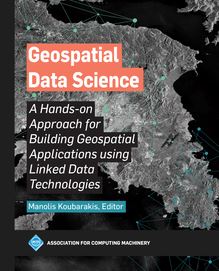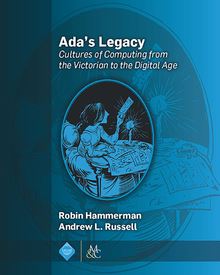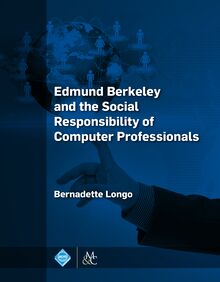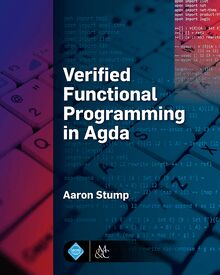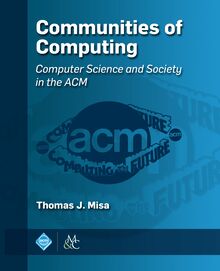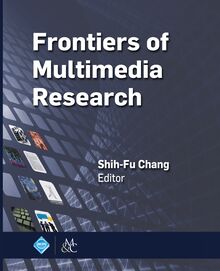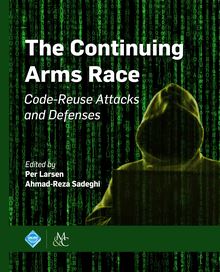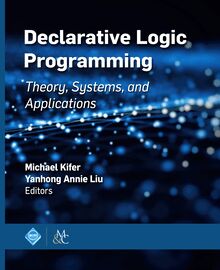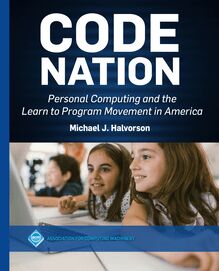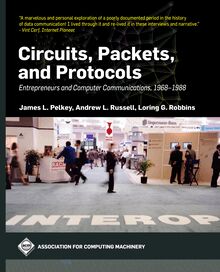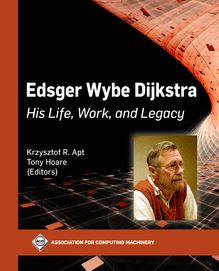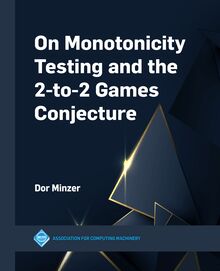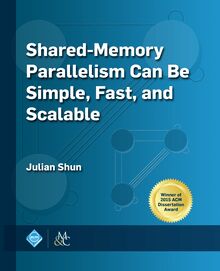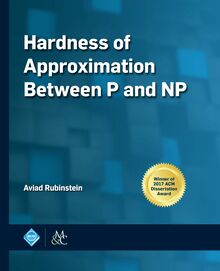-
 Univers
Univers
-
 Ebooks
Ebooks
-
 Livres audio
Livres audio
-
 Presse
Presse
-
 Podcasts
Podcasts
-
 BD
BD
-
 Documents
Documents
-
- Cours
- Révisions
- Ressources pédagogiques
- Sciences de l’éducation
- Manuels scolaires
- Langues
- Travaux de classe
- Annales de BEP
- Etudes supérieures
- Maternelle et primaire
- Fiches de lecture
- Orientation scolaire
- Méthodologie
- Corrigés de devoir
- Annales d’examens et concours
- Annales du bac
- Annales du brevet
- Rapports de stage
La lecture à portée de main
Vous pourrez modifier la taille du texte de cet ouvrage
Découvre YouScribe en t'inscrivant gratuitement
Je m'inscrisTheories of Programming , livre ebook
Découvre YouScribe en t'inscrivant gratuitement
Je m'inscrisEn savoir plus
Vous pourrez modifier la taille du texte de cet ouvrage
En savoir plus

Description
Sir Tony Hoare has had an enormous influence on computer science, from the Quicksort algorithm to the science of software development, concurrency and program verification. His contributions have been widely recognised: He was awarded the ACM’s Turing Award in 1980, the Kyoto Prize from the Inamori Foundation in 2000, and was knighted for “services to education and computer science” by Queen Elizabeth II of England in 2000.
This book presents the essence of his various works—the quest for effective abstractions—both in his own words as well as chapters written by leading experts in the field, including many of his research collaborators. In addition, this volume contains biographical material, his Turing award lecture, the transcript of an interview and some of his seminal papers.
Hoare’s foundational paper “An Axiomatic Basis for Computer Programming”, presented his approach, commonly known as Hoare Logic, for proving the correctness of programs by using logical assertions. Hoare Logic and subsequent developments have formed the basis of a wide variety of software verification efforts. Hoare was instrumental in proposing the Verified Software Initiative, a cooperative international project directed at the scientific challenges of large-scale software verification, encompassing theories, tools and experiments.
Tony Hoare’s contributions to the theory and practice of concurrent software systems are equally impressive. The process algebra called Communicating Sequential Processes (CSP) has been one of the fundamental paradigms, both as a mathematical theory to reason about concurrent computation as well as the basis for the programming language occam. CSP served as a framework for exploring several ideas in denotational semantics such as powerdomains, as well as notions of abstraction and refinement. It is the basis for a series of industrial-strength tools which have been employed in a wide range of applications.
This book also presents Hoare’s work in the last few decades. These works include a rigorous approach to specifications in software engineering practice, including procedural and data abstractions, data refinement, and a modular theory of designs. More recently, he has worked with collaborators to develop Unifying Theories of Programming (UTP). Their goal is to identify the common algebraic theories that lie at the core of sequential, concurrent, reactive and cyber-physical computations.
Sujets
Informations
| Publié par | Association for Computing Machinery and Morgan & Claypool Publishers |
| Date de parution | 26 septembre 2021 |
| Nombre de lectures | 0 |
| EAN13 | 9781450387309 |
| Langue | English |
| Poids de l'ouvrage | 1 Mo |
Informations légales : prix de location à la page 0,1598€. Cette information est donnée uniquement à titre indicatif conformément à la législation en vigueur.
Extrait
Theories of Programming
ACM Books
Editors in Chief
Sanjiva Prasad, Indian Institute of Technology (IIT) Delhi, India
Marta Kwiatkowksa, University of Oxford, UK
Charu Aggarwal, IBM Corporation, USA
ACM Books is a new series of high-quality books for the computer science community, published by ACM in collaboration with Morgan & Claypool Publishers. ACM Books publications are widely distributed in both print and digital formats through booksellers and to libraries (and library consortia) and individual ACM members via the ACM Digital Library platform.
Software: A Technical History
Kim W. Tracy, Rose-Hulman Institute of Technology, IN, USA
2021
The Handbook on Socially Interactive Agents: 20 years of Research on Embodied Conversational Agents, Intelligent Virtual Agents, and Social Robotics Volume 1: Methods, Behavior, Cognition
Birgit Lugrin, Julius-Maximilians-Universität of Würzburg
Catherine Pelachaud, CNRS-ISIR, Sorbonne Université
David Traum, University of Southern California
2021
Probabilistic and Causal Inference: The Works of Judea Pearl
Hector Geffner, ICREA and Universitat Pompeu Fabra
Rina Dechter, University of California, Irvine
Joseph Y. Halpern, Cornell University
2021
Event Mining for Explanatory Modeling
Laleh Jalali, University of California, Irvine (UCI), Hitachi America Ltd.
Ramesh Jain, University of California, Irvine (UCI)
2021
Intelligent Computing for Interactive System Design: Statistics, Digital Signal Processing, and Machine Learning in Practice
Parisa Eslambolchilar, Cardiff University, Wales, UK
Andreas Komninos, University of Patras, Greece
Mark Dunlop, Strathclyde University, Scotland, UK
2021
Semantic Web for the Working Ontologist: Effective Modeling for Linked Data, RDFS, and OWL, Third Edition
Dean Allemang, Working Ontologist LLC
Jim Hendler, Rensselaer Polytechnic Institute
Fabien Gandon, INRIA
2020
Code Nation: Personal Computing and the Learn to Program Movement in America
Michael J. Halvorson, Pacific Lutheran University
2020
Computing and the National Science Foundation, 1950–2016: Building a Foundation for Modern Computing
Peter A. Freeman, Georgia Institute of Technology
W. Richards Adrion, University of Massachusetts Amherst
William Aspray, University of Colorado Boulder
2019
Providing Sound Foundations for Cryptography: On the work of Shafi Goldwasser and Silvio Micali
Oded Goldreich, Weizmann Institute of Science
2019
Concurrency: The Works of Leslie Lamport
Dahlia Malkhi, VMware Research and Calibra
2019
The Essentials of Modern Software Engineering: Free the Practices from the Method Prisons!
Ivar Jacobson, Ivar Jacobson International
Harold “Bud” Lawson, Lawson Konsult AB (deceased)
Pan-Wei Ng, DBS Singapore
Paul E. McMahon, PEM Systems
Michael Goedicke, Universität Duisburg–Essen
2019
Data Cleaning
Ihab F. Ilyas, University of Waterloo
Xu Chu, Georgia Institute of Technology
2019
Conversational UX Design: A Practitioner’s Guide to the Natural Conversation Framework
Robert J. Moore, IBM Research–Almaden
Raphael Arar, IBM Research–Almaden
2019
Heterogeneous Computing: Hardware and Software Perspectives
Mohamed Zahran, New York University
2019
Hardness of Approximation Between P and NP
Aviad Rubinstein, Stanford University
2019
The Handbook of Multimodal-Multisensor Interfaces, Volume 3: Language Processing, Software, Commercialization, and Emerging Directions
Editors: Sharon Oviatt, Monash University
Björn Schuller, Imperial College London and University of Augsburg
Philip R. Cohen, Monash University
Daniel Sonntag, German Research Center for Artificial Intelligence (DFKI)
Gerasimos Potamianos, University of Thessaly
Antonio Kru g ¨ er, Saarland University and German Research Center for Artificial Intelligence (DFKI)
2019
Making Databases Work: The Pragmatic Wisdom of Michael Stonebraker
Editor: Michael L. Brodie, Massachusetts Institute of Technology
2018
The Handbook of Multimodal-Multisensor Interfaces, Volume 2: Signal Processing, Architectures, and Detection of Emotion and Cognition
Editors: Sharon Oviatt, Monash University
Björn Schuller, University of Augsburg and Imperial College London
Philip R. Cohen, Monash University
Daniel Sonntag, German Research Center for Artificial Intelligence (DFKI)
Gerasimos Potamianos, University of Thessaly
Antonio Kru g ¨ er, Saarland University and German Research Center for Artificial Intelligence (DFKI)
2018
Declarative Logic Programming: Theory, Systems, and Applications
Editors: Michael Kifer, Stony Brook University
Yanhong Annie Liu, Stony Brook University
2018
The Sparse Fourier Transform: Theory and Practice
Haitham Hassanieh, University of Illinois at Urbana-Champaign
2018
The Continuing Arms Race: Code-Reuse Attacks and Defenses
Editors: Per Larsen, Immunant, Inc.
Ahmad-Reza Sadeghi, Technische Universität Darmstadt
2018
Frontiers of Multimedia Research
Editor: Shih-Fu Chang, Columbia University
2018
Shared-Memory Parallelism Can Be Simple, Fast, and Scalable
Julian Shun, University of California, Berkeley
2017
Computational Prediction of Protein Complexes from Protein Interaction Networks
Sriganesh Srihari, The University of Queensland Institute for Molecular Bioscience
Chern Han Yong, Duke-National University of Singapore Medical School
Limsoon Wong, National University of Singapore
2017
The Handbook of Multimodal-Multisensor Interfaces, Volume 1: Foundations, User Modeling, and Common Modality Combinations
Editors: Sharon Oviatt, Incaa Designs
Björn Schuller, University of Passau and Imperial College London
Philip R. Cohen, Voicebox Technologies
Daniel Sonntag, German Research Center for Artificial Intelligence (DFKI)
Gerasimos Potamianos, University of Thessaly
Antonio Kru g ¨ er, Saarland University and German Research Center for Artificial Intelligence (DFKI)
2017
Communities of Computing: Computer Science and Society in the ACM
Thomas J. Misa, Editor, University of Minnesota
2017
Text Data Management and Analysis: A Practical Introduction to Information Retrieval and Text Mining
ChengXiang Zhai, University of Illinois at Urbana–Champaign
Sean Massung, University of Illinois at Urbana–Champaign
2016
An Architecture for Fast and General Data Processing on Large Clusters
Matei Zaharia, Stanford University
2016
Reactive Internet Programming: State Chart XML in Action
Franck Barbier, University of Pau, France
2016
Verified Functional Programming in Agda
Aaron Stump, The University of Iowa
2016
The VR Book: Human-Centered Design for Virtual Reality
Jason Jerald, NextGen Interactions
2016
Ada’s Legacy: Cultures of Computing from the Victorian to the Digital Age
Robin Hammerman, Stevens Institute of Technology
Andrew L. Russell, Stevens Institute of Technology
2016
Edmund Berkeley and the Social Responsibility of Computer Professionals
Bernadette Longo, New Jersey Institute of Technology
2015
Candidate Multilinear Maps
Sanjam Garg, University of California, Berkeley
2015
Smarter Than Their Machines: Oral Histories of Pioneers in Interactive Computing
John Cullinane, Northeastern University; Mossavar-Rahmani Center for Business and Government, John F. Kennedy School of Government, Harvard University
2015
A Framework for Scientific Discovery through Video Games
Seth Cooper, University of Washington
2014
Trust Extension as a Mechanism for Secure Code Execution on Commodity Computers
Bryan Jeffrey Parno, Microsoft Research
2014
Embracing Interference in Wireless Systems
Shyamnath Gollakota, University of Washington
2014
Theories of Programming
The Life and Works of Tony Hoare
Cliff B. Jones
Newcastle University, UK
Jayadev Misra
The University of Texas at Austin, US
ACM Books #39
Copyright © 2021 by Association for Computing Machinery
All rights reserved. No part of this publication may be reproduced, stored in a retrieval system, or transmitted in any form or by any means—electronic, mechanical, photocopy, recording, or any other except for brief quotations in printed reviews—without the prior permission of the publisher.
Designations used by companies to distinguish their products are often claimed as trademarks or registered trademarks. In all instances in which the Association of Computing Machinery is aware of a claim, the product names appear in initial capital or all capital letters. Readers, however, should contact the appropriate companies for more complete information regarding trademarks and registration.
Theories of Programming: The Life and Works of Tony Hoare
Cliff B. Jones and Jayadev Misra, Editors
books.acm.org
http://books.acm.org
ISBN: 978-1-4503-8728-6 hardcover
ISBN: 978-1-4503-8729-3 paperback
ISBN: 978-1-4503-8730-9 EPUB
ISBN: 978-1-4503-8731-6 eBook
Series ISSN: 2374-6769 print 2374-6777 electronic
DOIs:
10.1145/3477355 Book
10.1145/3477355.3477367 Chapter 11
10.1145/3477355.3477356 Preface
10.1145/3477355.3477368 Chapter 12
10.1145/3477355.3477357 Chapter 1
10.1145/3477355.3477369 Chapter 13
10.1145/3477355.3477358 Chapter 2
10.1145/3477355.3477370 Chapter 14
10.1145/3477355.3477359 Chapter 3
10.1145/3477355.3477371 Chapter 15
10.1145/3477355.3477360 Chapter 4
10.1145/3477355.3477372 Appendix A
10.1145/3477355.3477361 Chapter 5
10.1145/3477355.3477373 Appendix B
10.1145/3477355.3477362 Chapter 6
10.1145/3477355.3477374 Appendix C
10.1145/3477355.3477363 Chapter 7
10.1145/3477355.3477375 Appendix D
10.1145/3477355.3477364 Chapter 8
10.1145/3477355.3477376 Appendix E
10.1145/3477355.3477365 Chapter 9
10.1145/3477355.3477377 Bios/Index
10.1145/3477355.3477366 Chapter 10
A publication in the ACM Books series, #39
Editors in Chief: Sanjiva Prasad, Indian Institute of Technology (IIT) Delhi, India
Marta Kwiatkowksa, University of Oxford, UK
Charu Aggarwal, IBM Corporation, USA
This book was typeset in Arnhem Pro 10/14 and Flama using pdfTEX.
First Edition
10 9 8 7 6 5 4 3 2 1
Frontispiec
-
 Univers
Univers
-
 Ebooks
Ebooks
-
 Livres audio
Livres audio
-
 Presse
Presse
-
 Podcasts
Podcasts
-
 BD
BD
-
 Documents
Documents
-
Jeunesse
-
Littérature
-
Ressources professionnelles
-
Santé et bien-être
-
Savoirs
-
Education
-
Loisirs et hobbies
-
Art, musique et cinéma
-
Actualité et débat de société
-
Jeunesse
-
Littérature
-
Ressources professionnelles
-
Santé et bien-être
-
Savoirs
-
Education
-
Loisirs et hobbies
-
Art, musique et cinéma
-
Actualité et débat de société
-
Actualités
-
Lifestyle
-
Presse jeunesse
-
Presse professionnelle
-
Pratique
-
Presse sportive
-
Presse internationale
-
Culture & Médias
-
Action et Aventures
-
Science-fiction et Fantasy
-
Société
-
Jeunesse
-
Littérature
-
Ressources professionnelles
-
Santé et bien-être
-
Savoirs
-
Education
-
Loisirs et hobbies
-
Art, musique et cinéma
-
Actualité et débat de société
- Cours
- Révisions
- Ressources pédagogiques
- Sciences de l’éducation
- Manuels scolaires
- Langues
- Travaux de classe
- Annales de BEP
- Etudes supérieures
- Maternelle et primaire
- Fiches de lecture
- Orientation scolaire
- Méthodologie
- Corrigés de devoir
- Annales d’examens et concours
- Annales du bac
- Annales du brevet
- Rapports de stage
